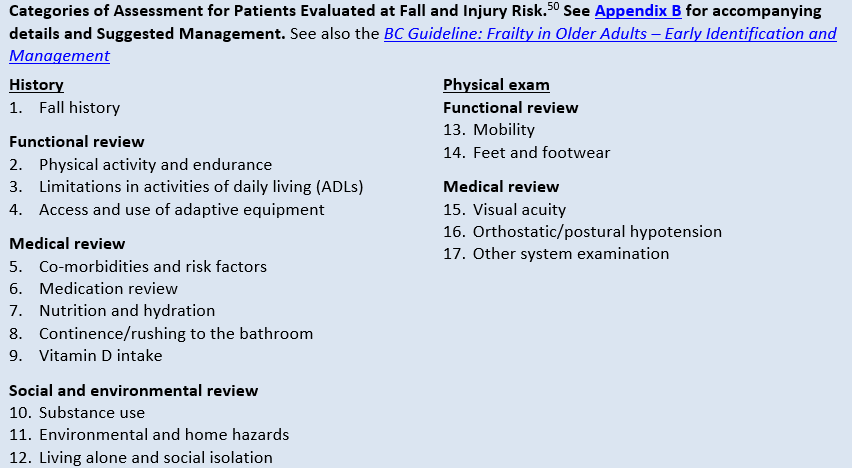Dementia Fall Risk - The Facts
Dementia Fall Risk - The Facts
Blog Article
The Dementia Fall Risk Ideas
Table of ContentsGetting My Dementia Fall Risk To WorkSome Known Details About Dementia Fall Risk Not known Facts About Dementia Fall RiskThe Of Dementia Fall RiskOur Dementia Fall Risk Statements
In the neighborhood, inadequate road lights or vulnerable creeks and landfills may additionally trigger crashes. Loss Danger Evaluation Device (FRAT) is a 4-item falls-risk screening tool for sub-acute and residential care. The FRAT has three sections: fall risk condition, risk factor list, and action plan. A Loss Danger Status consists of information regarding history of recent falls, medications, mental and cognitive standing of the individual.If the client ratings on a threat aspect, the corresponding number of factors are counted to the patient's fall risk rating in the box to the far. If a client's fall danger rating amounts to 5 or greater, the person is at high threat for drops. If the client scores only four factors or reduced, they are still at some danger of falling, and the registered nurse needs to use their best clinical assessment to handle all fall risk factors as component of an alternative treatment strategy.
These common methods, as a whole, help develop a risk-free setting that minimizes unexpected drops and delineates core safety nets for all individuals. Indications are crucial for people in jeopardy for drops. Doctor need to recognize that has the condition, for they are accountable for implementing actions to promote person security and prevent falls.
Some Known Details About Dementia Fall Risk
For instance, wristbands need to consist of the individual's last and very first name, day of birth, and NHS number in the UK. Information should be printed/written in black against a white history. Only red color must be used to signify unique person status. These suggestions follow current advancements in patient recognition (Sevdalis et al., 2009).
Products that are as well much might need the person to connect or ambulate needlessly and can possibly be a danger or contribute to drops. Assists stop the person from heading out of bed with no assistance. Nurses respond to fallers' phone call lights faster than they do to lights started by non-fallers.
Aesthetic disability can greatly trigger falls. Maintaining the beds closer to the floor minimizes the danger of drops and major injury. Positioning the mattress on the floor significantly minimizes autumn threat in some healthcare settings.
The Best Strategy To Use For Dementia Fall Risk
Individuals who are high and with weak leg muscular tissues that attempt to rest on the bed from a standing setting are likely to fall onto the bed since it's also reduced for them to lower themselves safely. Likewise, if a high patient efforts to rise from a reduced bed without aid, the patient is most likely to drop back down onto the bed or miss out on the bed and drop onto the flooring.
They're designed to promote prompt rescue, not to stop drops from bed. Distinct alarm systems can also advise the individual not to rise alone. Using alarms can likewise be a replacement for physical restrictions. Besides bed alarm systems, boosted supervision for risky clients also might help stop falls.

Individuals with a shuffling stride increase loss possibilities significantly. To lower autumn threat, shoes ought to be with a little to no heel, slim soles with slip-resistant tread, and sustain the ankles. Suggest client to make use of nonskid socks to stop the feet from gliding upon standing. Nevertheless, urge clients to put on suitable, well-fitting shoesnot nonskid socks for motion.
The 2-Minute Rule for Dementia Fall Risk
People, especially older adults, have decreased visual capacity. Lights a strange setting aids raise exposure if the person have to get up in the evening. In a study, homes with adequate lighting report less drops (Ramulu et al., 2021). Renovation in lighting at home may reduce fall prices in older grownups (Dementia Fall Risk). Making use of gait belts by all health and wellness care carriers can advertise safety and security when helping individuals with transfers from bed to chair.

Caretakers work for assuring a safe and secure, safeguarded, and risk-free environment. However, researches demonstrated extremely low-certainty proof that caretakers minimize autumn risk in intense treatment medical facilities and just moderate-certainty that choices like video clip surveillance can lower sitter use without enhancing autumn risk, recommending that sitters are not as helpful as initially believed (Greely et al., 2020).
Little Known Questions About Dementia Fall Risk.

Enhanced physical fitness reduces the danger for drops and restricts injury that is sustained when fall takes place. Land and water-based workout programs might be similarly useful on equilibrium and stride and thereby decrease the danger for drops. Water workout might contribute a positive benefit on balance and gait for ladies 65 years and older.
Chair Surge Workout is an easy sit-to-stand exercise that assists enhance the muscular tissues in the upper legs and butts and boosts mobility and independence. The goal is to do Chair Increase exercises without utilizing hands as the client ends up being stronger. See resources section for an in-depth direction on exactly how to do Chair Surge next page workout.
Report this page